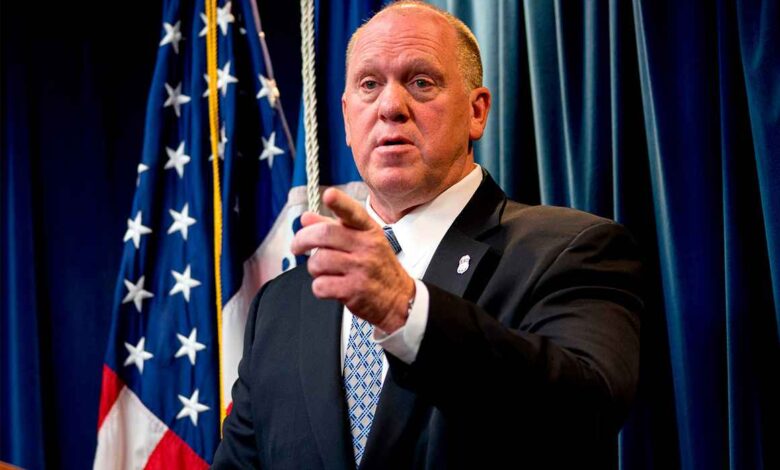
In a Stunning Decision, Trump Appoints Stephen Miller and Tom Homan to Key Roles
Donald Trump’s choice of Stephen Miller as Deputy Chief of Staff for Policy points to a transformation in immigration policy direction. Miller, a prominent figure from Trump’s previous administration, would lead immigration policy development if Trump wins another term. This appointment clearly shows Trump’s immigration priorities for a potential second term.
Trump’s immigration strategy pairs Miller with former Immigration and Customs Enforcement (ICE) Director Tom Homan as border czar. Their combined roles tap into the full potential of enforcement policies. The appointments match Project 2025’s conservative policy blueprint which outlines strict immigration control measures. Their focus will be deportation operations, border security protocols, and changes to both legal and illegal immigration processes.
Stephen Miller’s Role and Background
Stephen Miller’s promotion to White House Deputy Chief of Staff for Policy represents the most important expansion of his power over immigration policy. Miller, one of Trump’s longest-serving and most trusted advisers, has actively shaped the transition process and will have a significant impact on future staffing decisions.
Appointment as Deputy Chief of Staff for Policy
Miller’s new position will put him at the helm of Trump’s immigration agenda development and implementation. His responsibilities have expanded significantly from his previous role. The administration’s approach appears to minimize the need for new legislation and relies primarily on executive powers.
Miller’s history with Trump administration
Stephen Miller joined Trump’s 2016 presidential campaign as the lead speechwriter and shaped Trump’s immigration platform. His influence grew significantly during Trump’s presidency, where he became the key architect of the administration’s immigration policies. Miller later established America First Legal, a conservative organization. His organization now supports Project 2025, the Heritage Foundation’s complete blueprint that outlines plans for the next Republican presidency.
Key immigration policies developed by Miller
Miller led several major immigration initiatives during his tenure:
- The “zero-tolerance” policy at the southern border
- Travel restrictions targeting majority-Muslim countries
- Lower refugee admissions to the United States
- Plans to end the Deferred Action for Childhood Arrivals (DACA) program
Miller played a key role in shaping enforcement policies. He worked with government agencies to create stricter immigration controls. His strategy focused on deterrence and stronger enforcement measures. Recent statements from Miller promise a “spectacular migration crackdown” if Trump returns to office. The plans include military-built detention centers and a massive increase in deportation operations.
Tom Homan as Border Czar
Donald Trump has named Tom Homan as border czar for his upcoming administration. Homan, who previously served as acting director of U.S. Immigration and Customs Enforcement (ICE), will step into this position that bypasses Senate confirmation.
Responsibilities in the new role
Homan’s new position encompasses:
- Southern and northern border operations
- Maritime and aviation security measures
- Deportation of unauthorized immigrants to their countries of origin
- Implementation of targeted enforcement operations
Homan’s experience at ICE
Homan’s law enforcement career spans three decades with remarkable achievements. His journey started as a police officer in New York state and led him to become a Border Patrol agent. His dedication and leadership skills helped him climb through ICE’s ranks steadily. The Obama administration appointed him to lead ICE’s Enforcement and Removal Operations division where he received the prestigious Presidential Rank Award. His career peaked when he served as acting ICE director from January 2017 to June 2018 during Trump’s first term.
Stance on deportation and border security
Homan supports a targeted approach to immigration enforcement. His operations will be “well-planned” and “humane.” He has made it clear that military forces will not participate in immigration arrests. Instead, trained ICE personnel will conduct these operations. His strategy focuses on removing public safety threats and national security concerns, though workplace enforcement remains part of the work to be done.
Homan has rejected claims about mass neighborhood raids. He stresses that deportation operations will remain strategic and focused. While families might face deportation together, the priority targets are individuals who have received final deportation orders from immigration judges. This important change differs from current policies that restrict enforcement to serious criminals and recent border crossers.
Implications for U.S. Immigration Policy
A second Trump presidency could drastically transform U.S. immigration policy. Stephen Miller and Tom Homan plan to join forces that would lead to what Trump’s team calls the “largest domestic deportation operation in American history.”
What Trump’s most important policies might return
Plans are underway to bring back and broaden several policies from Trump’s previous term. These changes could reshape immigration rules:
- Birthright citizenship would end for children of unauthorized immigrants
- Travel bans would expand to more countries
- Immigration screening would become tougher based on ideology
- The “Remain in Mexico” policy would return for asylum seekers
Plans for increased deportations
The administration wants to exceed previous deportation numbers substantially. Immigration and Customs Enforcement (ICE) plans to target approximately 11 million unauthorized immigrants through improved enforcement operations. Their strategy has expanded workplace raids and uses quick removal processes that enable rapid deportations without standard legal hearings.
Impact on legal and illegal immigration
The proposed policies would change life for both authorized and unauthorized immigrants. The administration aims to switch to merit-based systems that limit family-based immigration paths. Students from other countries might need to meet tougher visa rules. Their work opportunities through Optional Practical Training (OPT) programs could shrink. H-1B visa rules might get stricter too. Some jobs could need up to 10 years of overseas work experience.
These policy shifts could shake up the American economy. Many key sectors like construction, agriculture, and technology depend heavily on immigrant workers. Mass deportation could hit the economy hard. The American Immigration Council projects a GDP drop between $4.04 trillion and $6.24 trillion. The construction sector would lose one in eight workers. This loss could drive up housing costs and slow down building projects nationwide.
Challenges and Criticisms
The proposed immigration enforcement strategy faces most important obstacles due to implementation challenges and widespread criticism. Immigration supporters and legal experts highlight major barriers that could block the administration’s plans.
Logistical hurdles in mass deportations
Mass deportation proposals face enormous logistical challenges. The American Immigration Council estimates that removing about 13 million unauthorized immigrants would cost $3.5 trillion over a decade. The total cost breaks down into:
- $327.9 billion to arrest individuals
- $616.2 billion to build and maintain detention centers
- $124.8 billion to handle legal proceedings
- $88.1 billion to conduct removal operations
Cornell University’s immigration law professor Stephen Yale-Loehr points out that constitutional due process makes quick deportations impossible. The immigration courts already struggle with a massive backlog of 3.6 million cases.
Opposition from immigrant rights groups
Immigrant advocacy organizations have started a movement to challenge the proposed policies. The American Civil Liberties Union plans to launch legal challenges as soon as new enforcement measures take effect. The nation’s largest immigrant youth-led organization, United We Dream, has created a strategy that combines protests, local legislation, and legal action.
Rights groups now conduct more “know your rights” training sessions and build support networks to help affected communities. The National Immigration Project cautions that these proposed policies could harm industries that depend on immigrant workers and create major economic problems.
Concerns about family separations
Human rights organizations have raised serious alarms about the possible return of family separation policies. These policies tore apart more than 5,500 children from their parents during Trump’s first term. The damage continues today – almost 1,000 children still haven’t reunited with their families since February 2023.
Medical evidence paints a grim picture. The American Academy of Pediatrics has found these separations cause permanent damage to children’s brain development and long-term health. A settlement agreement blocks similar separation policies until 2031. However, legal experts warn the administration might try different enforcement methods to work around these restrictions.
Trump shows his administration’s plans by picking Stephen Miller and Tom Homan. These choices put two seasoned hardline immigration officials in crucial roles to transform American immigration enforcement. Their joint strategy promises big changes to both legal and illegal immigration systems. The effects will go way beyond border security and reshape America’s economic, social, and demographic landscape.
This ambitious immigration agenda faces big obstacles. Logistical limits, legal battles, and strong pushback from advocacy groups create major roadblocks. Mass deportations would cost $3.5 trillion and disrupt businesses of all types. These facts raise questions about whether such policies can work and what it all means. The challenge lies in balancing enforcement goals with real-world implementation. Immigration policy will stay a hot national topic whatever happens with this strategy.







[…] Pentagon leadership bid. His nomination raises important questions about the direction of U.S. defense policy and military strategy. The Senate will need to evaluate his qualifications carefully. They will […]
[…] The Republican triumph means much more than just having more seats. A fundamental change emerges in federal policy creation and implementation. The GOP’s governing trifecta allows them to use their power effectively to push forward their legislative agenda. Their influence extends from tax reform to immigration policy. The nation will likely see major changes in the way leaders handle and implement key national priorities in the months ahead. […]
[…] Trump’s chosen team would focus on quick policy shifts, less regulation, tighter immigration control, and his doctrine of “peace through strength” abroad. The team’s success depends […]
[…] National security and immigration enforcement […]
[…] Aggressive immigration enforcement has caused systemic suffering among immigrant families in America. Today, more than 16.7 million people live in homes with at least one undocumented family member. This includes about 6 million children under 18. […]
[…] System will also take effect across 30 European countries in 2025. These systems aim to boost border security but must now handle different gender documentation […]
[…] separation becomes more difficult due to legal complexities. Immigration and Customs Enforcement deported 231,000 people who had at least one U.S.-citizen child between 2013 and […]
[…] Sanctuary cities strongly opposed the enforcement actions. San Jose’s Mayor Matt Mahan stated the police department would not take part in federal operations. Chicago’s City Council kept its sanctuary protections, which banned cooperation between local police and immigration agents. San Juan’s mayor promised support services to affected families, including citizenship classes and legal help. The Trump administration responded by threatening to look into jurisdictions that blocked federal immigration enforcement. […]
[…] years as president. Vance’s point of view moved by a lot in 2018 when he saw how immigration policies affected business operations. The Brett Kavanaugh Supreme Court nomination pushed his […]
[…] The Trump administration plans a broad travel ban that could impact citizens from 43 countries, a newly revealed White House memo shows. The proposal creates three distinct categories. Eleven countries, including Afghanistan, Cuba, and Venezuela, might face complete visa suspensions. This represents the most important expansion of the original 2017 travel restrictions that targeted five Muslim-majority countries. […]